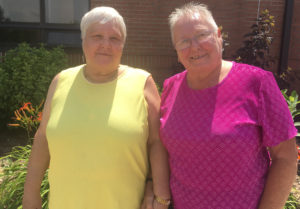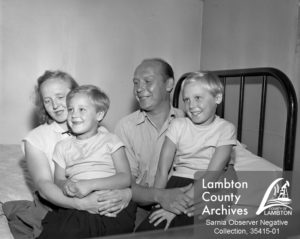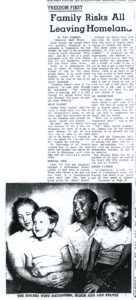
Author: Lambton County Archives – County of Lambton
The Lambton County Archives are home to a collection of 50,000 photo negatives from the Sarnia Observer which depict local newsworthy events from the 1950’s and 1960’s. Every summer, a post-secondary student is hired to work on digitizing this significant collection. In 2017, we hired Journalism Major Julie Mutis to work with the Sarnia Observer Negative Collection. While scanning negatives, Julie’s imagination was captured by a photograph of a young family arriving in Sarnia in the late 1950’s. Wanting to uncover more details about this family, Julie took the initiative to make contact with the sisters from the picture. Silvia and Marian were kind enough to travel to the Lambton County Archives and share their experiences with Julie, sitting down to talk with her about their emigration to Canada and sharing about their life here. Below is Julie’s article, published here on the Lambton County Archives blog as a Guest Blogger. Thank you, Julie!

Photograph of the Haler family in June 1957. Joseph, Maria, and daughters Silvia and Marian. From the Lambton County Archives Sarnia Observer Negative Collection.
This photo of the Haler family, Joseph, Maria and their two daughters Silvia and Marian, appeared in the Sarnia Observer on July 25th 1957. An interview with Joseph about the family’s escape from communist Yugoslavia accompanied the photograph. The family was happy to have finally arrived at their destination but uncertain about what was in store for them here in Canada. Sixty years later, Joseph and Maria’s daughters Silvia Freer and Marian Strangway are able to finish telling their family’s story.
In 1957 Slovenia was a part of Yugoslavia, a communist country ruled by Joseph Tito. In the 1957 interview, Mr. Haler spoke about Tito saying he only maintained control of the country through a strong military and police presence. Though Silvia and Marian were very young when they lived in Slovenia (8 and 6 respectively), they remember the climate of fear that prompted their emigration to Canada. “With the communists, nothing was for sure and if you didn’t do exactly as they say, they would kill you,” said Marian.
Joseph Haler, who worked as a police officer for most of his career in Slovenia, knew the dangers of going against the government’s agenda first hand. “When my dad’s life was threatened I guess that was when the decision was made that we had to get out of there,” said Marian. In 1957 a man came to the Haler’s house and warned Joseph that the military was planning to kill him. Marian and Silvia were not told the exact reason behind this threat but said that they were always told it had something to do with Joseph’s actions during the Second World War.
Joseph left the country first and arranged for his family to follow him soon after. Silvia and Marian recall having to climb mountains along the “Iron Curtain,” the guarded border between communist and democratic Europe, to meet the professional border crosser Joseph had hired to take his family into Austria. Although the two remember being nervous about crossing the border, they were not entirely aware of the situation they were in. “We were kids we didn’t have to clue what was going on,” said Silvia.
After crossing without incident, save the loss of one of Marian’s shoes, the family headed to a bus station and traveled to Maria’s sister’s home in Austria. “We were told to keep our mouths shut and not say a word while we were on the bus and from there on it was party time for us,” said Marian.
The Halers stayed with Maria’s sister in Germany and then at a refugee camp where the sisters attended school while their parents organized the details of their trip to Canada. The Halers left a port in Trieste, Italy on what the sisters describe as a very nice, luxury Italian ship. “Not that we were staying in the luxury section,” added Silvia.
The journey took around two weeks. “I know it was at least two weeks because we had fish on Fridays and the fish was not good,” recalled Silvia. The boat arrived in Montreal on Marian’s seventh birthday and after clearing customs, the Halers got on a train headed to Sarnia.
Although the family was happy to arrive in Sarnia, getting here was only half the battle. “Everything was new. We couldn’t even speak the language,” said Marian. The sisters said that their new neighbours made adjusting to life in Canada much easier. “I guess we’ve been really lucky we have always had good neighbors and good friends and everyone was always trying to help.” Silvia and Marian said their next door neighbours would even give them rides to school so they didn’t have to make the long walk.
The sisters attended St. Peters where their peers were very eager to help them learn English. “We picked up the language quickly,” said Marian. “Dirty words really quick,” added Silvia demonstrating a habit the sisters have of finishing each other’s thoughts. They said the kids at school would teach them swear words which they would repeat at home, excited to show their parents what they were learning. “Of course our dad picked them up too and started to use them,” said Silvia. It was Joseph’s friends who finally told him what kind of words his daughters were bringing home from school.

Marian Strangway (L) and Silvia Freer (R). Photo by Julie Mutis, July 2017.
Marian and Silvia said that learning English was harder for their parents than it was for them but with the help of friends and co-workers, they too learned quickly. Both Joseph and Maria quickly found employment upon arriving in Sarnia. A friend of Maria’s got her a job in the laundry department at the hospital. She soon transferred to housekeeping where she became a supervisor. Joseph had had a carpentry apprenticeship in Slovenia and continued that career in Sarnia.
Both Silvia and Marian graduated from SCITS and went on to relocate multiple times in Canada and the U.S. Both are now retired and spend their time volunteering for their respective communities of Port Huron and Sarnia.
Leaving their home and family in Slovenia was not ideal for Maria and Joseph but they did have the chance to go back. “It took a long time before anyone would go back because everything was so unsettled out there,” said Marian. The Halers became involved with the Slovenian club in Lobo and connected with other people who had been forced to flee their homes.
Silvia and Marian said that their father would often talk proudly about how he arrived in Canada with less than a dollar in his pocket. Despite this and all of the other uncertainties that the Halers faced when the Observer article was written, Marian said that “Before we knew it,” “it just all fell into place,” finished Silvia.
Big thanks to Pat Forbes, the Observer staff reporter who wrote about the Haler family in 1957.
Written by Guest Blogger Julie Mutis.

The original newspaper article, published in the Sarnia Observer, July 25, 1957, p. 13

Sarnia Observer, July 25, 1957, p. 26

